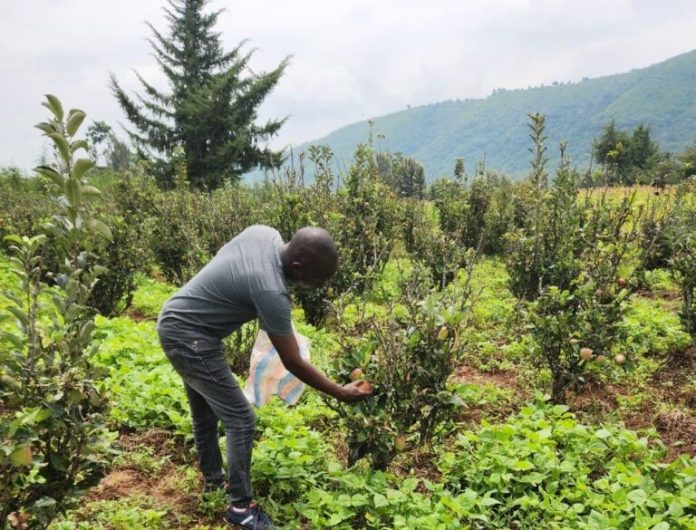John Rumba, a farmer in Ngarua in Laikipia County, is a proof that farming can be profitable if done correctly.
John grows high-value crops, including apple fruits, which spread across his farm, now a source of employment for a number of Kenyans.
In an interview with Farmers Trend, Rumba revealed his journey in apple farming started seven years ago when he planted 50 seedlings of grafted apples, which have now multiplied to over 1,000 trees.
The orchard grows multiple apple varieties, meeting various market demands. The varieties include Anna, Wambugu, Pink Lady, and Golden Dorset. Each has its strength, with Wambugu apples popular in Kenya due to their adaptability and crisp flavor.
On the other hand, Anna apples have a strong local demand, while Pink Lady and Golden Dorset fetch premium prices, especially among urban consumers in Nairobi.
According to the farmer, apple farming in Kenya is one of the most profitable ventures if managed well. A mature apple tree produces between 200 and 300 fruits each season.
At an average farm gate price of Sh20 per apple, the income from one tree easily surpasses many traditional crops.
The former dairy farmer says one of the key requirements in apple farming is enough water. He has installed a drip irrigation system that delivers water efficiently to each tree.
Jannifer Muthike: Kirinyaga farmer making Sh250,000 weekly from insect farming
Rumba also built a reservoir to store rainwater, ensuring a supply even during long dry spells. Without this investment, apple farming in Laikipia would not be possible.
Additionally, working with agronomists has also contributed to Rumba’s success. He says that soil testing, pest monitoring, and fertilizer application are done with expert guidance.
Instead of spraying chemicals blindly, he uses targeted advice to protect both the crop and the environment. Early detection of pests and diseases has saved him from major losses.
His advice to new apple farmers in Kenya is clear: farming should not rely on guesswork. Data and expert support make the difference between losses and profits.
Choosing the right seedlings has also been a game-changer for Rumba. All of his apple seedlings came from certified nurseries, grafted from high-yielding and disease-resistant varieties. He stresses that poor seedlings waste both money and years of effort.
He practices intercropping with beans, which fix nitrogen into the soil and reduce fertilizer needs. The beans also act as ground cover to control weeds and conserve soil moisture.
The farmer has also ensured strict orchard management including pruning and mulching. He prunes the trees to allow air circulation and sunlight penetration, which reduces the spread of fungal diseases. Mulching helps conserve water and maintain soil fertility.
The orchard employs 15 permanent workers and provides seasonal jobs during harvest. Rumba also trains neighboring farmers, teaching them about irrigation, grafting, and orchard management.









